China Arts & Entertainment
Top 10 Overview of China’s Most Popular TV Dramas of Fall 2018
The top scoring TV dramas in China of this moment – and they are almost all available with English subtitles.
Published
7 years agoon
By
Gabi Verberg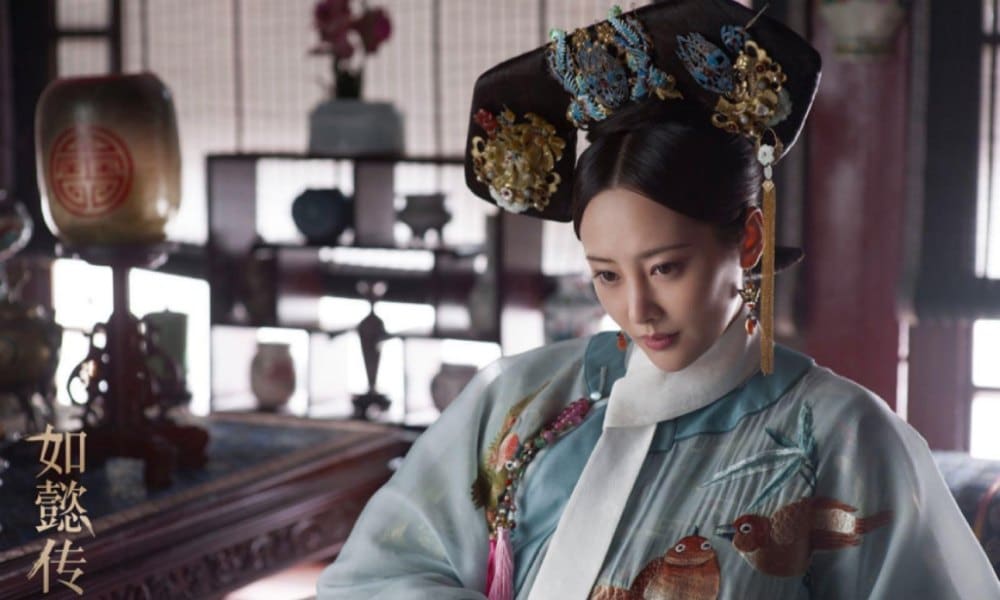
From beautiful costume series to suspenseful war-themed productions – these are the most popular TV dramas in China of this fall, an overview by What’s on Weibo.
Note: also see our Top 30 of all-time classic Chinese TV Dramas here!
China still has one of the most booming TV drama industries in the world, with dozens of new dramas being released every month, drawing in millions of viewers through the country’s most popular online video streaming platforms.
We’ve compiled a top ten of the most popular Chinese TV dramas of this fall, based on the current popular charts of the leading websites in Chinese online video, including Tencent Video, iQiyi, Sohu, Youku, LeTV, 360kan, Sogou Video, along with Baidu’s and Weibo’s popular TV drama charts.
This fall, Chinese viewers are mostly into dramas that are themed around (historical) love stories and suspense. What is noteworthy is that the often top-rated South-Korean tv dramas are not making it to the list of top-watched series this time, and that the current top 10 series are all produced in mainland China.
Please note that this list has been compiled by combining the top-ranking lists of this moment. And we have chosen to exclude popular drama series that already made it in our previous top-ten lists, such as White Deer Plain (白鹿原), despite their ongoing popularity.
Most of these series are available for viewing online with English subtitles. If you need a VPN to circumvent any geo restrictions, we recommend either NordVPN or ExpressVPN to do so.
#10 All Out of Love (凉生我们可不可以不忧伤)

Mainland China
Chinese title: Liáng shēng wǒmen kěbù kěyǐ bù yōushāng 凉生,我们可不可以不忧伤
Genre: Romance
Directed by: Liu Junjie (刘俊杰)
Episodes: 70, start 17 September 2018, Hunan TV
All Out of Love is based on the novel Liang Sheng, Can We Not Be Sad by Le Xiaomi (乐小米, also known as 纪伟娜). The TV series stars, among others, Wallace Chung (钟汉良), Ray Ma (马天宇) and Sun Yi (孙怡).
The series ranked fifth in the Weibo top ten most popular TV dramas and sixth position in the Youku top 10 TV drama series. Tencent Video ranked the series with an 8.2.
Growing up in rough times and poverty, Jiang Sheng and her adopted brother Liang Sheng are inseparable. Throughout the years, their greatest happiness lies in being by each other’s side. They eventually both develop feelings for one another, but despite them not being blood-related, they ignore their feelings. One day Liang mysteriously disappears, and Jiang is unable to find him. Years later, when Jiang is married, Liang suddenly comes back, and Jiang needs to face what is perhaps the most important decision of her life.
On Weibo, the official account of the series is nearing 375,000 fans right now.
See here the complete series including Chinese subtitles. Also available on Viki (incl. English subtitles).
#9 Battlefield Gun King (战地枪王)

Mainland China
Chinese title: Zhàndì qiāng wáng 战地枪王
Genre: War
Directed by: Li Yin (李印)
Episodes: 40, start 30 September 2018, Tianjin TV
Battlefield Gun King is the sequel in the ‘Gun King’ series following up The King of Guns (绝地枪王). However, it’s not really necessary to see the first series in order to understand this sequel.
Battlefield Gun King is currently ranking third place in the Sohu hotlists, and fifth place on the Youku most-watched lists. On iQiyi, the series scores a 7.1.
The TV drama tells the patriotic story of a family from China’s northeast, military hero Lu Yinghao, and the Chinese Communist Party’s fighting against the Japanese aggressors. It is 1945, and Lu Yinghao returns to China from the Soviet military base to celebrate his father’s birthday. At his arrival, he discovers that the Japanese military killed his family, mostly doctors, and other medical staff, to occupy the hospital. He decides to take revenge.
On Weibo, the official TV series account has approximately 22,000 fans.
See here on iQiyi the complete series with Chinese subtitles (no English).
#8 Mother’s Life (娘道)

China Mainland
Chinese title: Niángdào 娘道
Genre: Drama
Directed by: Guo Jingyu (郭靖宇) and Ju Xingmao (巨兴茂)
Episodes: 76, start 5 September 2018, Beijing TV and Jiangsu TV
Mother’s Life, starring Yue Lina (岳丽娜) and Yu Yi (于毅), tells the story of a young woman in times of China’s political turmoil around 1945.
The drama series is currently ranked first in the Sohu TV top ten, ranked seventh in the Weibo’s top 10 most popular TV dramas and is amongst the most popular series on Tencent Video.
Ying Gu is a young lady from a wealthy and influential big family. In the eight years she is married to her husband Long Jizong, they have three daughters. But when their third daughter is labeled a misfortune bearer, Ying Gu and her husband Xu Zhi are forced to move. Shortly after, Xu Zhi dies, leaving the pregnant Ying Gu all alone, which causes her to marry an opium addict out of desperation. One day, her new husband sells her third daughter to provide him with drugs. By taking out her rage, Ying Gu ends up in prison, where she thinks of a plan to reunite with her children.
See here the complete series including Chinese subtitles (no English).
#7 Ruyi’s Royal Love in the Palace (如懿传)
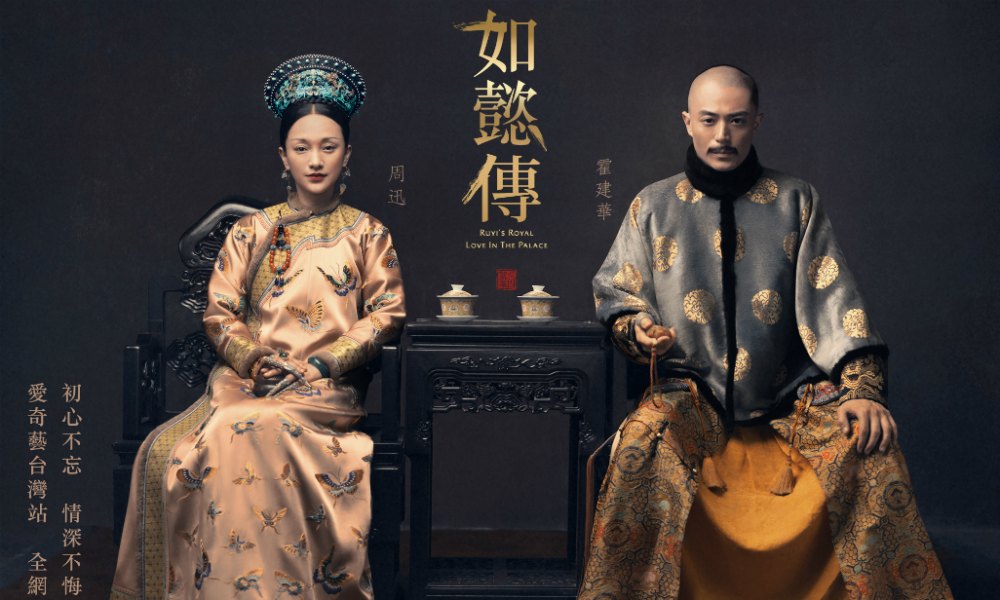
China Mainland
Chinese Title: Rúyì chuán 如懿传
Genre: Historical Drama
Directed by: Wang Jun (汪俊)
Episodes: 87, 20 August 2018, Tencent Video
Ruyi’s Royal Love in the Palace is an adaption from The Story of Empress Ruyi (后宫·如懿传) written by Liu Lianzi (流潋紫). In total, the book consists of six volumes which mainly tells the follow-up story of Empress in the Palace (后宫·甄嬛传) which subsequently was also made into a drama series in both 2011 and 2017. The 2017 production did not make this selection, however, it is currently ranked the most popular TV drama on LeTV.
Ruyi’s Royal Love in the Palace starring Zhou Xun (周迅) and Wallace Huo (霍建华) is currently ranked number one most popular series on 360kan, and number six on Baidu’s most popular drama list.
This fictional historical drama chronicles the marriage of Emperor Qianlong and his childhood friend and lover Ruyi. As Ruyi is a descendant of the Ulanara clan, she is only granted the position of consort. With the Empress Dowager as her sworn enemy, and dealing with the other consorts’ jealousy of her relationship with Qianlong, Ruyi faces many hardships in the palace. However, she is determined to become Empress Dowager of the Middle Kingdom.
With more than a million followers on the drama’s official Weibo account, it is one of the more popular TV series on social media in this list.
See here the complete series including Chinese and English subtitles, or watch on Viki.
#6 Martial Universe (武动乾坤之英雄出少年)

China Mainland
Chinese title: Wǔ dòng qiánkūn zhī yīngxióng chū shàonián 武动乾坤之英雄出少年
Genre: Fantasy, History, Martial Arts
Directed by: Zhang Li (张黎), assistant director Han Xiaojun (韩晓军)
Episodes: 40, 7 August 2018, Dragon TV
Just like Battle Through the Heaven, Martial Universe is based on a novel by author Li Hu (李虎), and was only published online.
This series starring Yang Yang (杨洋), Zhang Tianai (张天爱), Claudia Wang (Wang Likun/王丽坤), and Chun Wu (吴尊), is currently second most popular TV drama on Youku and third most popular series on Sogou Video.
This fantasy drama tells the story of Lin Dong, who, by coincidence, comes across a talisman with magical powers. After this encounter, his life will never be the same. Lin travels the world, and through his often very dangerous adventures, he gradually improves his skills as a martial artist. But will it be enough to face evil and save the world from demons taking over?
See here the complete series including English subtitles.
#5 Eagles and Youngster (天坑鹰猎)

China Mainland
Chinese title: Tiān kēng yīng liè 天坑鹰猎
Genre: Youth, Adventure, Suspense
Directed by: Cheng Zhichao (成志超)
Episodes: 40, 30 August 2018 on Youku, 25 September at Dragon TV
Eagles and Youngster is a coming-of-age story, adapted from the novel with the same name written by Zhang Muye (张牧野).
The series is currently ranked first in the Youku TV drama charts and ranking fourth in the Weibo’s top 10 most popular TV dramas.
With main characters played by Karry Wang (王俊凯) born in 1999, Vicky Chen (陈文淇) born in 2003, and supporting actress Jiang Yiyi (蒋依依) born in 2001, the cast of Eagles and Youngsters is the youngest amongst this list.
Eagles and Youngster revolves around city boy Zhang Baoqiang, who goes on an adventure with his two friends to find medicine to save their mentor’s life. On their way, Zhang accidentally finds an egg that hatches into a majestic white eagle. The creature ignites a series of events that put the young heroes in danger, and they begin to understand the meaning of life and deepen their understanding of the relationship between humankind and nature.
The series currently has 1,2 million fans on its official Weibo account.
See here the complete series including Chinese and English subtitles.
#4 Battle Through the Heavens/Fight Break Spheres (斗破苍穹)

China Mainland
Chinese title: Dòu pò cāngqióng 斗破苍穹
Genre: History, Martial Arts, Fantasy
Directed by: Yu Songguang (于宋光)
Episodes: 45, start 3 September 2018, Hunan TV
Battle Through the Heavens starring Leo Wu (吴磊), Lin Yun (林允), Baron Chen (陈楚河), Li Qin (李沁) and Xin Zhilei (辛芷蕾) is an adaption of the like-named online novel by novelist Li Hu (李虎).
The series is currently ranked second in both Baidu’s and Weibo’s top 10 most popular TV dramas and is scored a 7.8 at Tencent Video.
The story revolves around Xiao Yan, whose mother was killed when he was only nine years old. Even though he was born a genius child, he lost all of his powers. At age 15, his martial arts skills are still average until he accidentally meets You Chen. With the help of the old man, Xiao Yan makes fast advances in martial arts. When he finds out that he and his family are doomed, he decides to embark on a journey to revanche his mothers’ killer and eliminate forces of evil.
There are more than 551,000 fans following this series on its Weibo account right now.
See here the complete series including Chinese and English subtitles.
#3 Story of the Yanxi Palace (延禧攻略)

China Mainland
Chinese title: Yán xǐ gōnglüè 延禧攻略
Genre: Historical Drama
Directed by: Hui Yidong (惠楷栋) and Wen Deguang (温德光)
Episodes: 70, 19 July 2018, Zhejiang TV
This is the second production in our list (see: Ruyi’s Royal Love in the Palace) that revolves around emperor Qianlong, starring the very popular Wu Jinyan (吴谨言) as the main character.
Story of the Yanxi Palace is currently holding second place on 360kan’s TV drama’s hotlist and also on iQiyi it is amongst the most popular series of this moment, getting a high score of 8.0.
According to SCMP, the high standards and meticulous research of the production team regarding highly authentic props and story lines that stick to the history are a major part of this drama’s succes.
Story of the Yanxi Palace tells the story of the young girl Wei Yingluo who enters the Forbidden City as a palace lady, aiming to find out the truth about her sisters’ death and seek justice. She develops a friendship with the empress, who helps her up the ranks in the imperial palace to become a strong court lady. But when the Empress dies, Wei Wei is facing danger from an unexpected place.
See here the complete series including Chinese and English subtitles.
#2 Age of Legends (橙红年代)
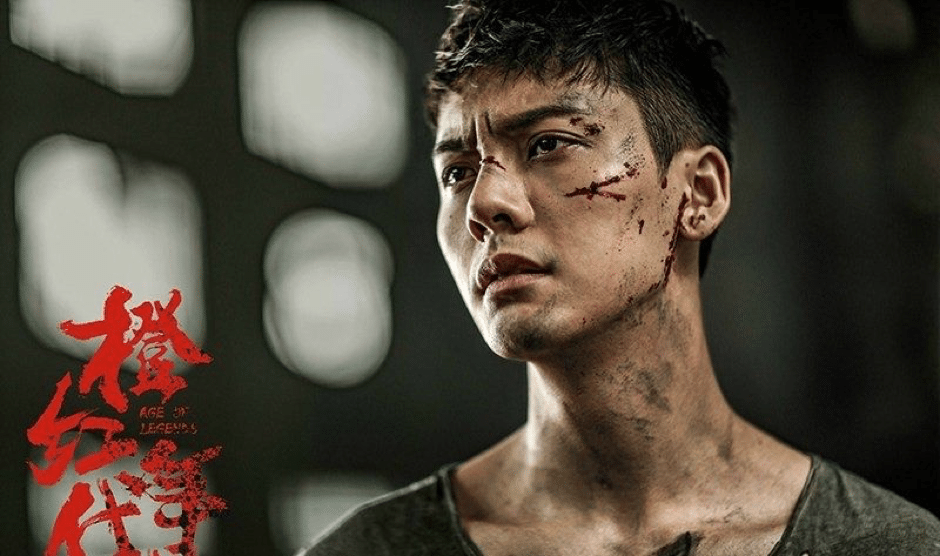
China Mainland
Chinese title: Chénghóng niándài 橙红年代
Genre: Drama, Crime
Directed by: Liu Xin (刘新)
Episodes: 47, start 17 September 2018, Zhejiang and Dragon TV
Age of Legends starring William Chan (陈伟霆) and Ma Sichun (马思纯) is based on the like-named novel by Xiao Qixiao (骁骑校) and is currently ranked first in the iQiyi popular drama chart and scores an 8.5 at Tencent Video.
The drama follows the life of Liu Ziguang, who returns to his hometown after working overseas for eight years. He suffers severe memory loss of this period and wants to live a happy and simple life. He unexpectedly meets Hu Rong, a young female detective, and the two fall in love. But good times don’t last long as Liu finds himself entangled in a dangerous situation. Together they go on a hunt for the truth and justice.
See here the complete series including Chinese and English subtitles.
#1 Ashes of Love (香蜜沉沉烬如霜)
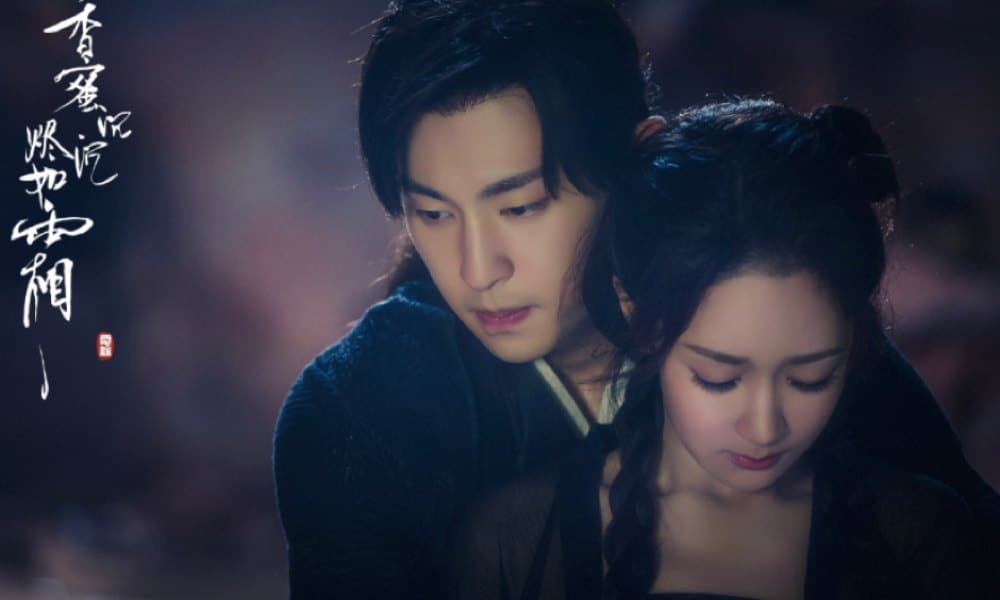
China Mainland
Chinese title: Xiāng mì chénchén jìn rú shuāng 香蜜沉沉烬如霜
Genre: Fantasy, Drama, Romantic, Action, Suspense
Directed by: Zui Ruibin (朱锐斌)
Episodes: 63, 2 August 2018, Jiangsu TV, iQiyi, Tencent Video, and Youku.
Ashes of Love in an adapted screenplay from the like-named novel written by Dian Xian. The drama is starring two of China’s currently most popular actors Yang Zi (杨紫) and Allen (邓伦). The played each other’s lovers before, in the 2012 drama series Flowers in Fog (花非花雾非雾), leading to Allen’s breakthrough.
That the two main actors are a good match is proved by the immense popularity of these series. The drama series is currently ranked first on Sogou Video, and third at 360kan’s most popular TV dramas list. And also the users of Tencent Video show their appreciation of the series, scoring it with an 8.9.
Ashes of Love tells the story of the thousand-year romance between the flower deity called Jinmi, and the fire deity, called Xufeng. Right before Jinmi’s mother gives birth to a daughter, she finds out that her daughter will suffer a great love drama. To spare her daughter, she swallows a pill preventing her daughter from feeling romantic love. Not knowing true love, she gets involved in a relationship with Xufeng.
See here the complete series including Chinese and English subtitles.
Want to see more? Also check out our
– Top 10 Chinese TV dramas of Summer 2018
By Gabi Verberg
Follow @whatsonweibo
Spotted a mistake or want to add something? Please let us know in comments below or email us.
©2018 Whatsonweibo. All rights reserved. Do not reproduce our content without permission – you can contact us at info@whatsonweibo.com.
Gabi Verberg is a Business graduate from the University of Amsterdam who has worked and studied in Shanghai and Beijing. She now lives in Amsterdam and works as a part-time translator, with a particular interest in Chinese modern culture and politics.

China Arts & Entertainment
The Wong Kar-wai Scandal Explained: The Dark Side of ‘Blossoms Shanghai’
Whenever reports surfaced about the harsh conditions on Wong Kar-wai’s sets, mainstream media and fans often brushed off his tyrannical habits as the quirks of a genius. This time, it feels different.
Published
2 months agoon
October 3, 2025By
Ruixin Zhang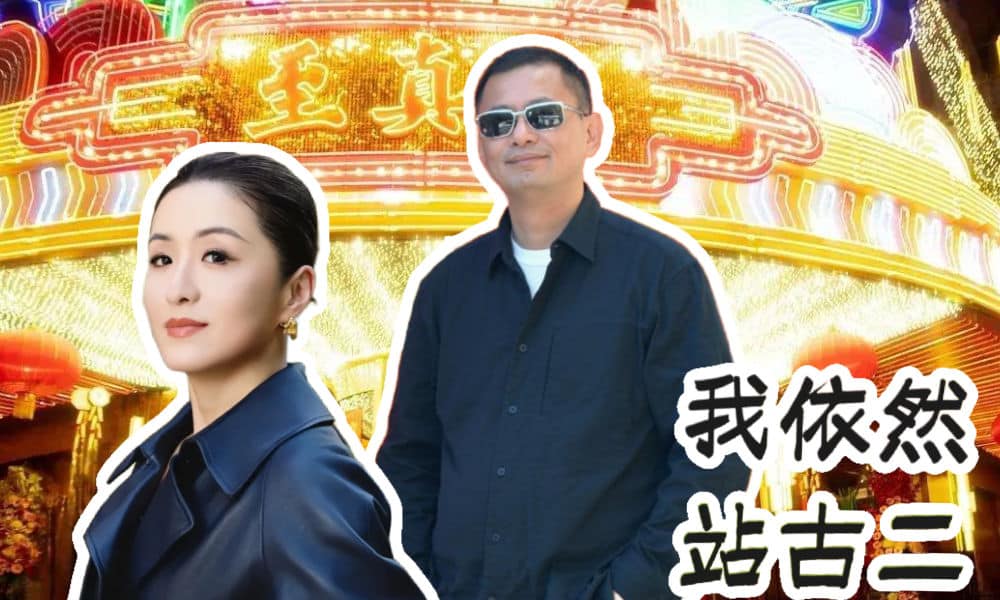
After renowned director Wong Kar-wai was accused of exploiting a young writer during the production of the hit TV drama Blossoms Shanghai, a scandal unfolded that may be one of the biggest stories in China’s entertainment industry this year.
Even if you don’t recognize him by face, you most likely know him by name: Wong Kar-wai (王家卫, 1958), the internationally acclaimed Hong Kong movie director.
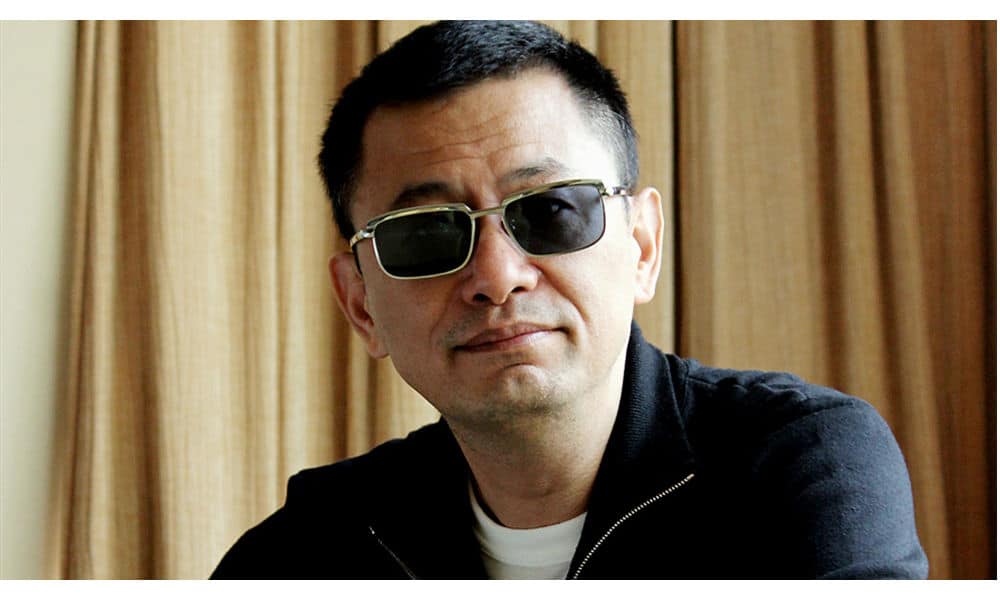
Director Wong Kar-wai, characteristically in sunglasses. (Image via Iazimao).
In late 2023, Wong Kar-wai released his first television series, Blossoms Shanghai (繁花), which was referred to a being the third part of an informal Wong Kar-wai trilogy that started with his films In the Mood for Love and 2046. Thanks to its superior production quality, star-studded cast, and Wong Kar-wai’s signature visual style, it became one of the most talked-about Chinese TV dramas of the time.

Scenes from Shanghai Blossom.
Adapted from Jin Yucheng’s award-winning novel, Blossoms Shanghai is set in 1990s Shanghai and tells the story of a young man, A Bao (played by Hu Ge 胡歌), who aspires to become a successful businessman and self-made millionaire during China’s booming reform era. The series contrasts the protagonist’s troubled past with the city’s vibrant present—and even sparked a wave of visitors to Shanghai landmarks featured in the show.
“Overnight, the headline “Wong Kar-wai Suspected of Exploiting Employees” became the biggest story in Chinese entertainment news”
However, in September, screenwriter Gu Er (古二,real name Cheng Junnian 程骏年) stirred controversy when he published a post on his WeChat official account, @GuErNewWords (古二新语), accusing Wong Kar-wai and lead writer Qin Wen (秦雯) of serious exploitation during the production of Blossoms Shanghai.
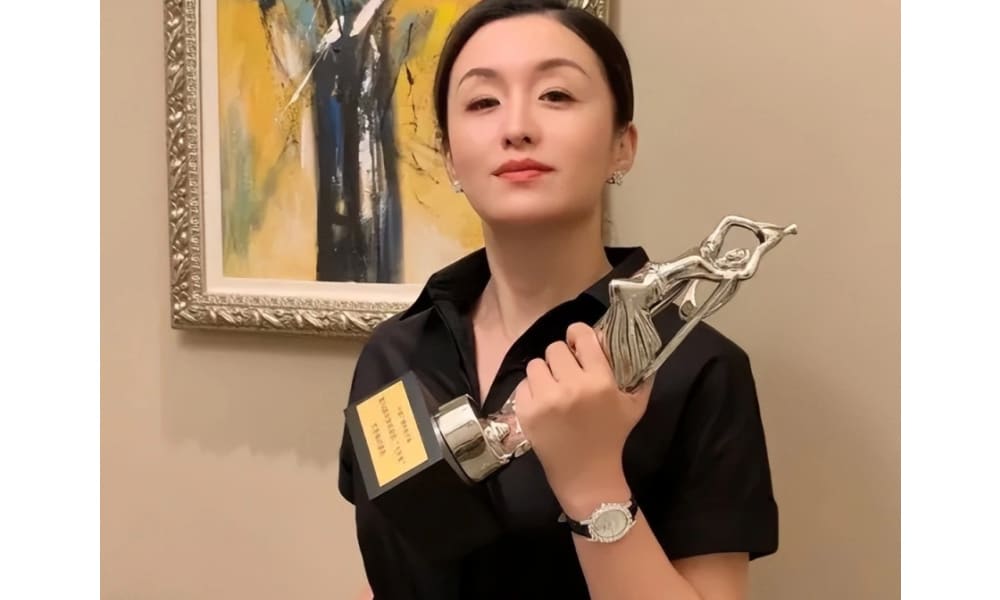
Qin Wen, image via Tencent News.
Overnight, the headline “Wong Kar-wai Suspected of Exploiting Employees” (王家卫《繁花》被爆疑似压榨员工) became the biggest story in Chinese entertainment news.
Gu Er is an experienced young screenwriter. After earning a master’s degree from the New York Film Academy, he returned to China, where he worked in theater and dabbled in online films. Though he never became a household name, he had carved out a modest presence in the entertainment industry.
According to a series of diaries he began sharing on WeChat in 2022, Gu Er first joined the Blossoms production team in 2019.

Example of Gu Er’s writings, where he talked about the difficult conditions of working on the Blossoms production.
He described the experience as “powered purely by love” (用爱发电)—in other words, long hours, meager pay, and sheer passion keeping him afloat. These early posts detailed many interactions with Wong Kar-wai and lead scriptwriter Qin Wen, but since the drama had not yet aired, his satirical, lightly veiled critiques attracted little attention.
“When the credits rolled, Gu Er’s name was nowhere to be found under the screenwriting slot”
In 2023, upon the premiere of the series, Gu Er published an article titled “The Truth Behind the Writing of Blossoms” (《繁花》剧本的创作真相). In it, he claimed to have written substantial portions of the storyline and character arcs—work that, he said, had been personally approved by Wong.
He also shared chat screenshots and presented several key concepts he had pitched, many of which viewers later recognized in the broadcast series.
Yet when the credits rolled, his name was nowhere to be found under the screenwriting slot. Instead, he was listed only as “preliminary editor” (前期责编), buried at the very end of the credits in a position so minor it was almost negligible.
For Gu Er, this was humiliating. He believed that his field research, character development, and story-building should have earned him recognition as at least one of the principal writers. The post sparked some discussion, but once again, the controversy quickly faded.

Cheng Junnian is Gu Er’s real name, and in the later recordings he posted, Wong Kar-wai also called him by his real name.
It wasn’t until September 16, 2025—nearly two years later—that Gu Er released another definitive essay, “My Experience as a Screenwriter for Blossoms: A Summary” (《我给〈繁花〉做编剧的经历——小结》).
This time, he laid bare every painstaking detail of his creative process for the main female character’s storyline. He claimed that the production refused to reimburse any of his research and interview expenses—not even for meals or books. He recalled one particular moment: “Once I spent 100 yuan [$7], and the Hong Kong producer immediately scolded me in public: ‘How does writing cost any money?’”
“It’s just a few thousand yuan; he is an assistant and can also write the script—it’s a bargain”
Besides writing duties, Gu Er said he also had to cook meals and run endless errands for Wong Kar-wai. In fact, Gu Er suffers from Kennedy’s disease, a motor neuron illness similar to ALS but slower in progression. Like ALS patients, he is gradually losing strength in his limbs. The intense, high-pressure work environment on set made his condition much worse. When he first told Wong Kar-wai about his health, Wong allegedly responded with nothing but suspicion: “What do you want from me?”

Gu Er, image from the time he was a guest chef at Dee Hsu’s reality show.
Wong Kar-wai wasn’t the only person Gu Er accused of exploitation. He also named lead screenwriter Qin Wen, one of the most prominent figures in Chinese television, known for hit dramas such as The First Half of My Life (我的前半生) and My Heroic Husband (赘婿). Qin is also credited as the screenwriter of Blossoms. According to Gu Er, once his draft script was handed to Qin Wen, she “made a few revisions,” and it was then presented as her work.
He further alleged that Qin tried to push him out of the production team, but Wong Kar-wai intervened, saying: “It’s just a few thousand yuan; he is an assistant and can also write the script—it’s a bargain.”
This post finally drew widespread attention. While the public was shocked by the alleged misconduct of a beloved director, many also questioned Gu Er’s credibility.
The Blossoms production team quickly issued a statement, asserting that more than 2,000 crew members had all been properly credited, and later clarified that Gu Er had only been part of the early-stage research team.
“The very type of boss you’d be too afraid to confront in your own workplace”
However, netizens began combing through Gu Er’s WeChat account and discovered that, in recent months, he had uploaded a series of audio recordings of conversations among the production staff—including Wong and Qin.
These recordings became crucial evidence in Gu Er’s defense. In one recording, a producer admitted that Qin had used ghostwriters and that several major plotlines had, in fact, been written by Gu Er. She also acknowledged that it would be difficult for him to receive proper credit.
Other tapes revealed the director’s harsh treatment of crew members; in one instance, Gu Er himself was publicly humiliated and accused of being “a dog using its master’s power” (狗仗人势).
On September 22, Gu Er released another recording. This time, it featured Wong Kar-wai and Qin Wen gossiping about several well-known actors; when the conversation ended, they asked Gu Er to serve them their food.
Having studied at Le Cordon Bleu in San Francisco, Gu Er had apparently been cooking for Wong without pay. Netizens were particularly angered by how arrogant and condescending Wong sounded in the recording, which many said reminded them of the very type of boss they had been too afraid to confront in their own workplaces.
At the same time, netizens dug up a 2024 report from Hong Kong’s Ming Pao (明报), which detailed how a female screenwriter’s script for Blossoms had also allegedly been exploited by Wong Kar-wai. That writer, too, reportedly suffered from depression as a result.
“The Gu Er incident is a snapshot of class solidification”
On September 23, Gu Er’s WeChat account was taken down, rendering all of his articles and audio recordings inaccessible.
Since both WeChat and the parent company of Blossoms’ production house, Tencent Pictures, are owned by Tencent, netizens immediately speculated that the platform had silenced Gu Er to contain the scandal. The move only fueled public suspicion that Wong had indeed exploited young writers—and calls grew louder for an official response from Wong Kar-wai.
As the controversy spread, screenwriter Qin Wen posted a denial on Weibo, insisting that she had been slandered.
Oscar-winning cinematographer Peter Pau (鲍德熹), who worked on Blossoms, also weighed in, saying that all responsibilities had been clearly outlined in the contracts and accusing Gu Er of deliberately stirring trouble. Hong Kong director Wong Jing (王晶) likewise voiced his support for Wong Kar-wai.
However, the broader public—the majority of netizens as well as many within the industry—stood by Gu Er.
The film news account Qiangbaoshan (@誓要抢包山) commented that regardless of the exact truth of Gu Er’s claims, it was already alarming and unjust that major figures in the film industry had banded together to discredit him while his own platform was banned.
Commenters on Xiaohongshu wrote thousands of posts in defense of Gu Er, calling the incident “a snapshot of class solidification,” or writing: “I also stand with Gu Er. Either you hire a proper chef, or you clearly define the work. If someone contributes ideas and creativity, then give them the pay and credit they deserve.”
Gu Er’s friend Ma Nong (玛侬) also published an article on her WeChat official account in his defense, sharing new photos of Gu Er at work and on set to prove that he had indeed played an important role in the Blossoms production.
Yet through it all, to this day, Wong Kar-wai himself has not uttered a single word in response.
“Because of his cinematic achievements, the media and fans often laughed off his tyrannical behavior as the eccentric quirks of a genius”
Some netizens, after learning the details, were puzzled by Gu Er’s behavior. They criticized him as weak and overly servile, suggesting that what he faced now was partly the result of his own personality flaws.
Yet this very dynamic may be why the public’s anger toward Wong Kar-wai ran so deep. Wong is arguably one of the most influential directors in Chinese cinema. Works such as In the Mood for Love, Chungking Express, and Happy Together have left an indelible mark on world cinema and inspired generations of filmmakers. For a relative ‘nobody’ like Gu Er, Wong Kar-wai would have seemed an idol—a god-like figure (Gu Er also expressed his love and admiration for Wong in his previous articles). And it may have been precisely this sense of awe and worship that left Gu Er vulnerable to workplace bullying and manipulation.
Wong Kar-wai’s harsh treatment of his actors and crew has actually never been a secret. Famous actors who previously worked with him, such as Leslie Cheung and Tony Leung, have spoken openly about his extreme working methods. After filming Happy Together, Leslie Cheung announced that he would never work with Wong again, later revealing that he felt the director had exploited his sexuality. During the shoot of Ashes of Time (东邪西毒), Cheung nearly died from poisoning in the desert. Even in their earlier collaborations, he was often tormented by Wong’s constant changes and endless demands.
Wong’s obsessive pursuit of his own has repeatedly come at the expense of those around him. While filming The Grandmaster, he reportedly withheld actress Song Hye-kyo’s passport and kept her on set for months, only to use a handful of shots in the final cut.
Yet, because of his cinematic achievements, the media and fans often laughed off his tyrannical behavior as the eccentric quirks of a genius.
After the Gu Er controversy, however, many began to re-examine the man behind the perpetual sunglasses—not as an untouchable auteur, but as an employer accountable for his power. Wong Kar-wai has long been known for procrastination, perfectionism, and “torturing actors,” but the stakes of this reputation now feel different.
Meanwhile, Gu Er’s WeChat account remains banned. It is difficult to imagine why a man already battling a degenerative illness would continue to fight so publicly for recognition, unless he felt he had nothing left to lose.
Writer Shuimuding (水木丁) raised deeper concerns about Gu Er’s desperate, all-or-nothing stance, reminding readers of the darker history of the Chinese film industry, where young talent has been pushed to despair—and sometimes even to death—by powerful figures. The most haunting example is Hu Bo (胡波), the brilliant director of An Elephant Sitting Still (大象席地而坐), who took his own life after facing similar pressures.
This is why the Wong Kar-wai scandal matters. No matter how talented the director, actual exploitation can never be justified for the sake of the project. Perhaps it is time to stop using exceptional artistic talent as an excuse for unacceptable workplace dynamics.
By Ruixin Zhang
Independently covering digital China for over a decade. Like what we do? Support us and get the story behind the hashtag by subscribing:
edited for clarity by Manya Koetse
Spotted a mistake or want to add something? Please let us know in comments below or email us. First-time commenters, please be patient – we will have to manually approve your comment before it appears.
©2024 Whatsonweibo. All rights reserved. Do not reproduce our content without permission – you can contact us at info@whatsonweibo.com.
China Arts & Entertainment
Evil Unbound (731): How a Chinese Anti-Japanese War Film Backfired
731 was China’s most anticipated war movie of the year — how could it fail so miserably to live up to public expectations?
Published
2 months agoon
September 24, 2025
🔥 This is premium content and also appeared in the Weibo Watch newsletter. Subscribe to stay in the loop.
How did Evil Unbound (731), one of the most anticipated Chinese war movies of 2025, go from patriotic hype to online backlash? A deep dive into the official narrative, the audience reception, and everything that’s particular about this movie.
731 and 918, those were the numbers dominating Chinese social media over the past week. Both numbers carry heavy historical weight, but the recent discussions surrounding them reveal two parallel worlds of the official narrative vs the audience experience of a controversial new World War II film.
It was “9.18” on Thursday, when China commemorated the 94th anniversary of the September 18th Incident (九一八事变). On that day in 1931, a small explosion on a Japanese-owned railway near Shenyang (Mukden) was used as a pretext to invade Manchuria.
While many older Chinese were taught in school that the war began in 1937, recent state-led campaigns increasingly emphasize 1931 as the true beginning of China’s “14-year-long war” (1931–1945). Over the past decade, the 918 commemorations have become more prominent online, shaping public memory through nationalistic messaging.
This year, the commemoration had an extra dimension, as it wove the release of Evil Unbound (English title), also known as 731, into the patriotic media narratives around 918.
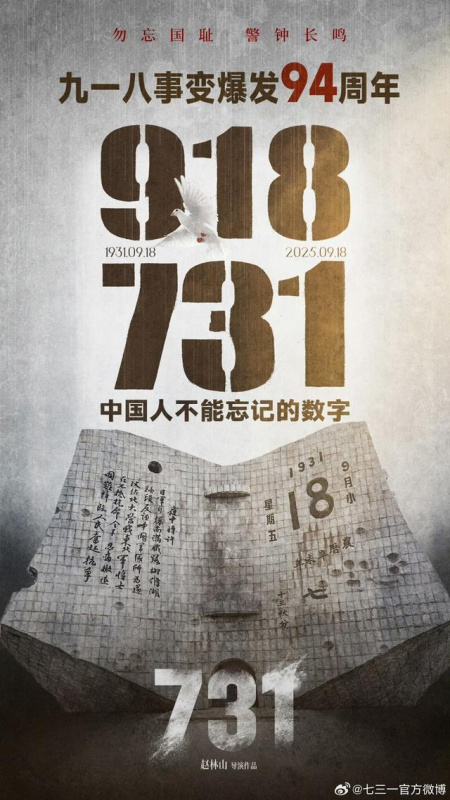
Patriotic film poster putting 918 and 731 together.
The much-anticipated war movie 731 depicts the atrocities of Japan’s Unit 731 (731部队), notorious for conducting horrific biological warfare experiments in Harbin during World War II under Major General Shiro Ishii (石井四郎), a former army surgeon and biologist with a particular interest in historical plagues. Under his command, Japan’s biological warfare and human experimentation in China were carried out on a larger scale than anywhere else between the 1930s and 1940s.
After the war, because the US felt his knowledge on bioweapons was of great value, Ishii was granted political immunity deal and was never brought to trial.
Together with the Nanjing Massacre, Unit 731 has come to symbolize the peak horrors of Japan’s wartime atrocities. Public attention for this history has grown in recent years, especially since the 2015 opening of the Harbin-based Museum of Evidence of War Crimes by Unit 731.
It was around that same time, about a decade ago, when Chinese director Zhao Linshan (赵林山) started working on the movie Evil Unbound (731), produced by Changchun Film Group in collaboration with the Propaganda Departments of Shandong, Jilin, Heilongjiang, and Harbin.
It finally premiered nationwide on Thursday, ‘9.18’ at exactly 9:18 and shattered 10 box office records on its opening day. Screened 258,000 times in a single day, it rapidly surpassed 200 million yuan (US$28 million) in ticket sales. After three days, the box office exceeded 1 billion yuan (US$140 million).
The film focuses on Unit 731 in the final days before Japan’s defeat in 1945, portraying how local salesman Wang Yongzhang (王永章, played by Jiang Wu 姜武) is imprisoned together with other civilians. They are promised freedom in exchange for “health checks and epidemic prevention cooperation,” and are subjected to frostbite experiments, poison gas, and vivisections.

Official film posters for Evil Unbound/731.
“What we made is not a movie — it is historical evidence,” director Zhao said about the film.
A state-orchestrated hashtag ecosystem is currently amplifying the film’s ‘success.’ Similar to previous viral war film hits such as The Battle at Lake Changjin (长津湖) and Nanjing Photo Studio (Dead to Rights 南京照相馆), the media campaigns highlight the film’s commercial performance, its educational and historical value, the ‘authenticity’ of its production process, and its emotional reception and overseas recognition.
Recent trending hashtags, from Kuaishou to Weibo and beyond, include:
- 电影731票房再创新高 – “Film 731 sets another box office record”
- 没有人能在看731时不流泪 – “No one can watch 731 without crying”
- 观众掩面哭泣 / 哭到没法接受采访 – “Audiences cover faces in tears” or “Audiences too moved to be interviewed”
- 观众自发起立唱国歌 – “Audience spontaneously stand up to sing national anthem”
- 海外观众看731不停抹泪 – “Overseas audiences weeping when seeing 731”
- 9岁小孩看完731后泪奔 – “9-year-old child burst into tears after watching 731”
- 日本观众看完电影731后情绪崩溃 – “Japanese audiences having emotional breakdown after watching 731”
- 让731这段历史不再沉默 – “The history of 731 can no longer be silenced”
There are hundreds of other hashtags contributing to this official narrative, that portrays Evil Unbound as an absolute patriotic and commercial triumph.
From Anticipation to Backlash: 731 Between Shawshank and Squid Game
Outside of this official narrative, however, audiences are telling a very different story. Despite months of anticipation, the film has been met with overwhelmingly negative reviews.
On Weibo, the hashtag “731 Film Review” (#731影评#) was pulled offline. On Douban, the movie’s ratings meter was switched off entirely (“暂无评分”). On IMDb, the film is currently rated 3.1.
Usually, criticism of patriotic films is a slippery slope. People have been censored, blocked, or even detained for criticizing war films. But criticism of this film is so widespread, and so ubiquitous across social media platforms, that it is barely containable.
Many viewers called the movie “trash,” while others said they felt “defrauded”.[1] One commenter suggested the director tried to make The Shawshank Redemption but ended up with Squid Game.[2] Others called it “bizarre”[3], or concluded: “The short review section doesn’t even allow enough characters to describe how unbearable this movie is.”[4]
Viewing the film, I must admit I also felt confused – the movie is nothing like you would expect after the state-led promotion of the film.
The opening minutes quickly set a messy historical context, leaping from the 1925 Geneva Protocol to China’s 1943 counteroffensives, to Iwo Jima, and to Japan’s “Operation PX” plan (Operation Cherry Blossoms at Night), a scheme to attack the United States with biological weapons—before landing in Harbin and Unit 731 in the year 1945.
About ten minutes in, the movie seems to switch tracks and take inspiration from Squid Game, the 2021 South Korean survival drama.
Some details appear almost one-to-one from the Netflix show: the cold speaker voice, characters labeled by numbers, stylized lighting (including the Japanese flag’s red dot turned into menacing red spotlight), and eerily sterile sets that create a cold, clinical atmosphere stripped of humanity.
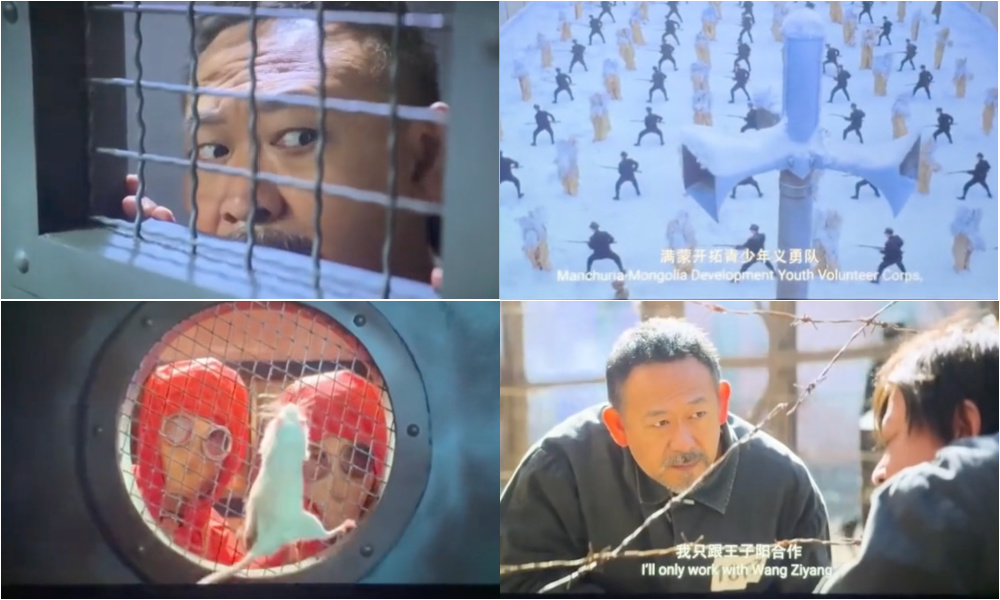
Scenes from 731.
Narrative elements also echo Squid Game’s deadly competitions, including an actual life-or-death rope pulling game. In 731, “winners” are promised freedom (but actually sent for experiments) and “losers” surviving slightly longer, until even these rules seemingly disappear, leaving viewers just as lost as the characters.
Beyond these echoes of Squid Game and The Shawshank Redemption (with their themes of prison break, brotherhood, and hope), where horror meets drama and occasionally even comedy, I also thought I saw traces of The Green Mile (there’s even a befriended mouse), The Shining, One Flew Over the Cuckoo’s Nest, and even Kill Bill.
If this all sounds like a fever dream, that’s about right.
While the film undoubtedly has artistic value in its visual references and symbolism, at times it seems more intent on presenting itself as an arthouse production than on telling a coherent historical war story.
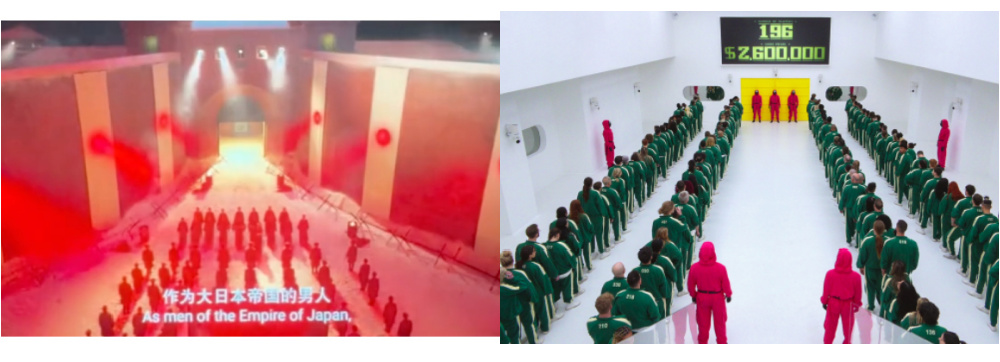
731 scene showing Japanese flags with red lasers/spotlights one the left. Some of the movie’s camera angle points, color use, narrative elements and settings show some similarities with Squid Game (image on right).
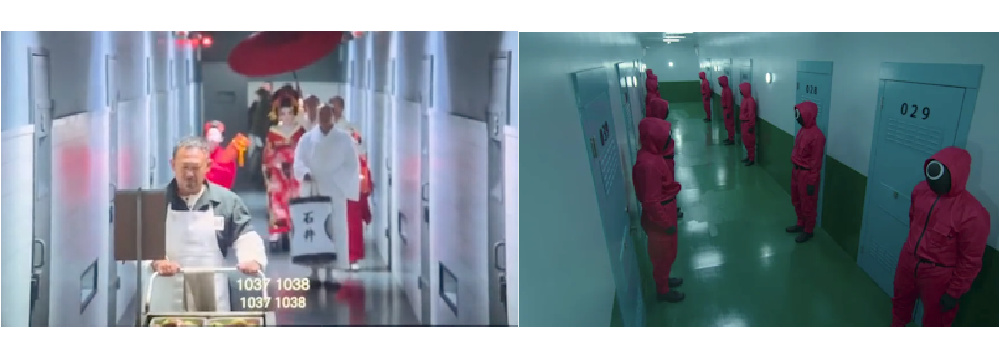
731 (left), Squid Game (right)

Scene from 731, which I thought sometimes had some echoes from The Shining.

Another reference to Stanley Kubrick? 731 on the left, Clockwork Orange on the right.

Prison mouse friend. 731 (left) and The Green Mile (right).
And that is also what most of the online critique is about – people feel that while the movie is supposed to be about creating awareness of a particularly horrific part of Chinese war history, the actual factual history seems to have ended up in the background.
One commenter from Harbin wrote:[5]
💬 “For Harbin, 731 is the most painful chapter of history. This movie uses a mass of absurd visuals and music to tell a story that has almost nothing to do with real history. All the information that truly should have been shown is brushed over in passing words, and in the end it just tells audiences ‘never forget history’? This tramples on the history of 731. Stupid and vulgar.”
Others are also upset over historical inaccuracies in the film — from the makeup to the sets, the props, and the biological experiments. Even the toilet paper used by the prisoners isn’t very realistic, with some commenters saying these kinds of details ‘drove them crazy’:
💬 “I’m born after 1990, and even I grew up with worse toilet paper than what the aggressors in those years apparently gave to their prisoners. Theirs was so high-quality you could fold it into bows and baby shoes. Must have been strong, durable, and waterproof.”[6]
One other reviewer on Douban wrote:
💬 “As a prison break film it’s not exciting, as a historical film it’s too careless, and as a drama it’s too fragmented.”[7]
Douban reviewer Qingyun (青云) noted that it jumps from relatively calm scenes to intense emotional outbursts or extreme cruelty without any buildup — instead of moving viewers to tears, it alienates them from the story and its characters.
He adds:
💬 “The film wants to exploit history’s seriousness to entertain the public, but also fears the theme is too depressing and will affect the box office, so it stuffs in commercial gimmicks (jokes, fantasy, spectacle). This opportunism sacrifices the solemnity that is rewired for the historical topic, while also failing to provide as qualified entertainment. The result: it offends history and disappoints audiences.”[8]
Most of these disappointed reviewers argued that the chance to tell the story of Unit 731 was wasted by a director and script that offered little context to the subject, with some even suggesting that another, 37-year-old film (Men Behind the Sun, 黑太阳731, 1988) did a better job of conveying the history of Japan’s biological warfare in China.
A ‘Masterful Cult Film,’ But a ‘Total Failure’ as a War Movie
Despite the wave of strongly negative feedback, there are also those who did find the film moving, giving it five-star reviews — some from those who stress the film’s value as a reminder to “never forget national humiliation,” while others genuinely appreciate its creative vision.
Douban commenter ‘Bat Lord’ (蝙蝠君) called it a “masterful cult film” with the film’s aesthetics being “built on a foundation of Western stereotypical Orientalism of Japan and layered with Christian martyrdom.”[9]
As an example, Bat Lord describes a recurring scene in which prisoners are taken from their cells toward “freedom,” only to be taken to lethal human experiments. They are escorted by Japanese guards in traditional kimonos with samurai swords, led by a geisha carrying a bright red umbrella and wearing impossibly high okobo clogs, followed by Edo-period guards with topknots and white kimono. Bat Lord calls it “Orientalist punk seen through a Western gaze” (“有一种西方视角的东方主义朋克的味道”).
The reviewer also interprets the main characters, the Chinese prisoners, as representations of Christian martyrdom. Cross symbols are indeed everywhere in the film, with prisoner No. 017 constantly drawing crosses on the wall, and an ingenious escape plan hidden in a dictionary as a series of crosses.
At the climax, after battling guards in kimonos with wooden swords, the prisoners flee toward a crematorium resembling a cathedral of light, where crosses formed from pure white beams symbolize freedom. But behind the cross loom the Japanese executioners. After a bloody massacre, the survivors are captured and executed — tied to crosses arranged around a pit, with fleas dropped on them from above as Japanese officers watch from a grandstand.
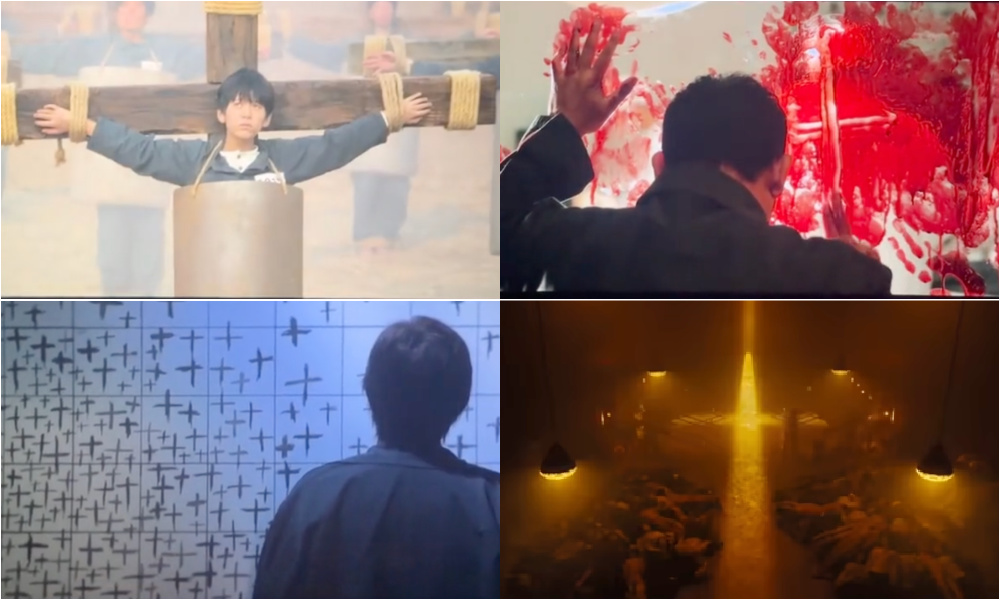
Cross symbols appear throughout the film.
💬 “It’s clearly a direct homage to Christian martyrs who were sacrificed in the Colosseum during the ancient Roman Empire. In the end, all the protagonists die martyrs’ deaths,” Bat Lord writes.[10]
He concludes that the film is “4/5 as an art house film, but zero points as a war movie”:
💬 “As a mainstream patriotic commercial blockbuster, it is a complete and utter failure (..) But as a niche cult prank film, it actually has some positive points (…) – built on exaggerated Orientalist visions of Japan, it feels strangely authentic. This kind of deconstruction of Japanese culture isn’t something the Japanese themselves could do — only the West or China, as seen in works like The Last Samurai, Ghost of Tsushima, and Shogun.” [11]
He adds:
💬 “The biggest problem is the subject matter. Using 731 — such a solemn, tragic history — only to hollow out its pain, exploit national emotions, and repackage it as a cult prank film disguised as a patriotic blockbuster, inevitably backfires. If it had been framed as a semi-fictional low-budget black comedy, the backlash wouldn’t be so severe.”[12]
“No Japanese in Heaven”: Over-‘Othering’ the Enemy
How could 731 have failed so miserably to live up to public expectations?
In recent years, Chinese museums, books, and popular culture have made many attempts to revitalize the history of war and make it more relevant to younger generations. In many cases, this has been successful, from popular war dramas to blockbuster films.
But Unit 731 is perhaps an especially difficult subject to adapt into a commercially successful film for a broad audience, especially since it chose to leave out the kind of contextualization that Oppenheimer provided in exploring the history, process, and character development that led to the atomic bomb.
Like the gas chambers of Auschwitz or Mengele’s brutal experiments, its history is so gruesome that there is little to focus on beyond the suffering of the victims and the cruelty of the perpetrators. (The film had already been postponed once, as it allegedly failed to pass official screenings due to its graphic scenes.)
War films in China are expected to reflect — or help shape — national identity. In 731, this means boosting national unity by focusing on Japan as the ultimate “Other,” the ‘constructed outsider’ against which the own national identity is defined.
The entire nation is cast as an enemy, depicted through exaggerated cultural symbols — geishas, kimonos, samurai, and cherry blossoms — regardless of whether they belonged in the actual prison setting. Japan’s national colors and imagery are fused with scenes of bloody and barbaric slaughter, turning Japanese cultural identity itself into a target.
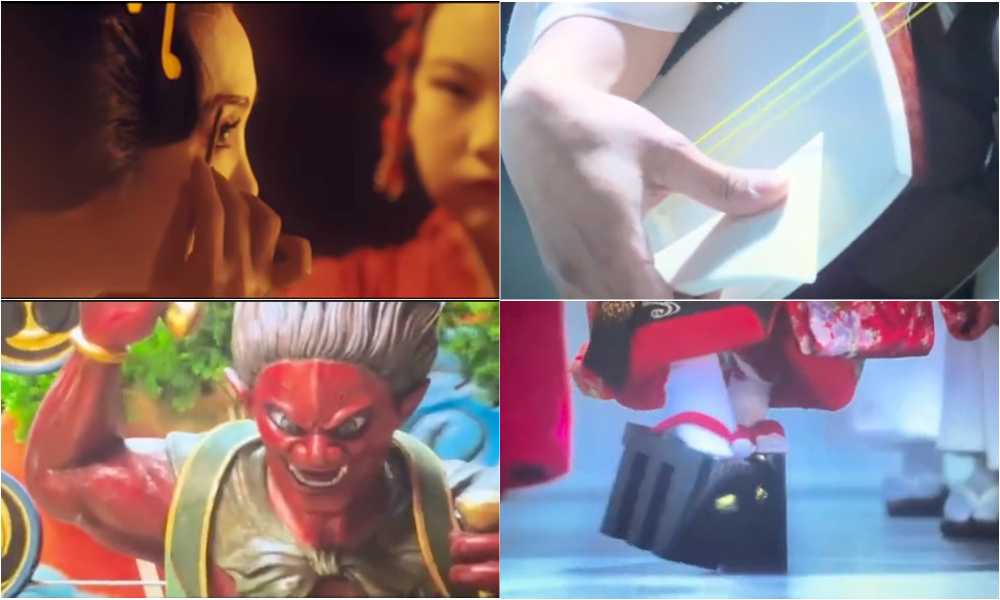
References to Japanese cultural symbols in the film.
In doing so, the film not only holds Japan as a whole responsible for its wartime aggression, but also strengthens Chinese identity by defining it in opposition to Japan, visually contrasting “good” versus “evil” through opposing characters, colors, and symbols.
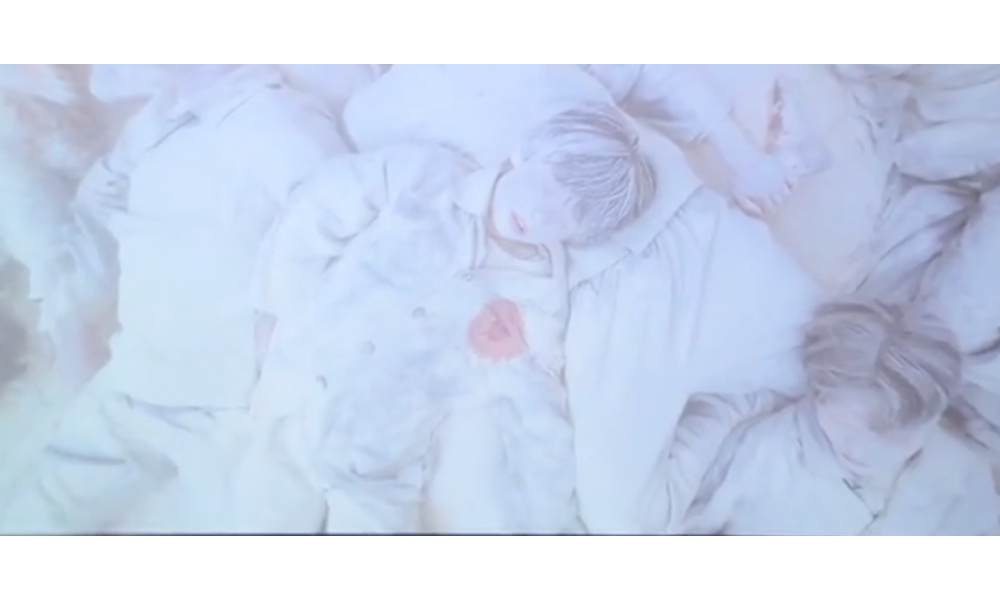
Clear visual symbols: dead Chinese bodies covered in white dust. With the red circle of blood, the scene resembles a Japanese flag.
This contrast is also made explicit in dialogue: at the beginning of the film, for instance, a young boy enters the stark white prison halls and asks, “Master, are we in heaven?” to which the older Chinese man replies, “Nonsense, how could there be Japanese in heaven?”
In promoting the film, director Zhao Linshan (赵林山) reinforced the image of Japan as the eternal “Other” by explaining that he had insisted none of the Japanese roles could have possibly played by Chinese actors, suggesting they would not be able to convey their evilness. Despite the difficulty of bringing over more than 80 Japanese actors during China’s ‘zero Covid’ era, when 731 was largely filmed, Zhao maintained that “only the Japanese can play this dual nature.”
While Chinese social media is often filled with anti-Japanese sentiment, many viewers criticized the depiction of “Japan” and the Unit 731 staff — not because of the anti-Japanese angle, but because they felt it trivialized history. They argued that Unit 731 was already so horrific that it needed no added gimmicks, tropes, or exaggerated villains to make it look bad.
As Douban reviewer Qingyun wrote:
💬 “Portraying devils as clowns diminishes their true guilt. The real criminals were rational, organized, and intelligent, embodying the will of Japanese militarism as a systematic project. Making them idiots (..) greatly underestimates the danger and organization of militarism, and is a severe simplification of history.”[13]
This critique goes further, suggesting the film both weakens its warning value (“the true terror is that advanced civilization and barbarism can coexist”) and cheapens the victims’ suffering (“if the enemy is so stupid, the tragedy seems less grave”).
On Weibo, one commenter criticized this one-sided approach:
💬 “I saw an auntie in Hangzhou who, after watching the movie 731, said she hated the Japanese devils so much — that she would hate them for her entire life. But this elderly woman, brainwashed by hatred education for a lifetime, doesn’t stop to think that (..) so many other brutal slaughters happened throughout Chinese history. If you only speak of hate, can your hate keep up with all of them? Shouldn’t we instead explore and reflect more deeply on the underlying causes of these events? Better to talk less of hate and more of love — because only the most genuine love from the depths of the human heart can ultimately prevent such tragedies from happening again.”[14]
Some viewers who appreciated the film, however, disagreed. One Weibo user wrote: “I watched the film with my husband and on our way home we scolded the Japanese, wishing we could throw two more atomic bombs on them. It was a good film.”
Between the history and the hate, the official narrative, the polarized audience reactions, and disagreements over the film’s message, 731 has brought more controversy than clarity.
But beyond the debate and confusion, one message remains clear. As one viewer wrote:
“The film wasn’t what I expected, but I’m not sure what I even expected? A good story? More like a documentary? There’s one thing I can say for sure: this movie is just a shell — the history itself is the soul.”[15]
By Manya Koetse
Spotted a mistake or want to add something? Please let us know in comments below or email us. First-time commenters, please be patient – we will have to manually approve your comment before it appears.
References
- “看完有种被诈骗的感觉” (source: Douban).
- “一句话评价《731》,导演按照《肖申克的救赎》拍出了《鱿鱼游戏》” (source: Xiaohongshu).
- “令人非常迷惑” (source: Douban).
- “短评骂的字数不够了实在是忍不了了” (source: Douban).
- “作为一个哈尔滨人,去过至少三次纪念馆,731对于哈尔滨就是最沉痛的一段历史,这个电影用大量极其荒诞的镜头和音乐,讲述一个基本跟真实历史毫无关系的故事,所有真正需要拍出来的信息全部是文字一笔带过,最后却告诉观众勿忘历史?这是对731这段历史的践踏。弱智且下流” (Source: comment section Sina).
- “作为一个90后,我出生的那个年代卫生纸质量都达不到侵略者给实验体使用的,纸的质量太好了,又是编蝴蝶结,又是编鞋子的,我猜应该是坚韧又耐用,透水都不断的那种吧” (Source: Douban long reviews).
- “或许是删减太多或许是各种局限,当做越狱不精彩,当做历史片太随意,当做剧情片太碎片”(Source: Douban).
- “影片既想利用沉重历史的严肃性作为宣传噱头,又担心题材过于压抑影响票房,于是强行注入商业娱乐元素(搞笑、幻想、刺激场面)。这种“既要…又要…”的投机心态导致影片既失去了历史题材必需的敬畏感,又未能提供合格的娱乐体验。最终,它既冒犯了历史,也辜负了观众”(Source Douban, review by Qingyun (青云).
- “西方刻板印象东方主义日本与基督殉难的碰撞,cult片的杰出之作”(Source: Douban, review by ‘Bat Lord’ (蝙蝠君).
- “很明显也在致敬古罗马帝国时期殉道在斗兽场的圣徒们。最终主角团全员殉道,无一幸免。”
- “这个片作为主流主旋律商业大片是完全的,彻头彻尾的失败,彷佛那纯纯的依托!甚至从预告片开始这电影就没有任何一丝一毫的符合历史,我从一开始就完全没有抱任何期望的去看,结果发现这片作为小众邪典整蛊片却颇有可取之处(。。)当你不认为这片是正常电影之后,这片表达出的那股子真的是超正宗的外国视角下的刻板印象东方主义日本美学、东方朋克味,这种对日本文化的魔怔向的解构其实我个人还真感觉挺不错的。这种解构日本人是搞不出来的,目前只有欧美和中国能搞出来,代表作就是《最后的武士》、《对马岛》、《幕府将军》之类的作品,里面的日本文化,日本武士道精神一个赛一个魔怔,欧美是往骑士幻想的那个路子去走的,我们是往黑暗邪典的路子去走的“
- “所以这片的最大问题还是选择了731这个严肃题材,完全在消解历史的悲痛,消费民族的情感,拍了个小众邪典整蛊片后,还按照主流商业片来包装和宣发,如果他拍成半架空的超小成本黑色喜剧我觉得反噬恐怕不会有这么大”(Source: Douban).
- “它美化了真正的邪恶:将恶魔塑造成小丑,实际上减轻了他们的罪责。真实的731部队不是一群疯癫的傻瓜,而是清醒的、有组织的、高智商的罪犯。他们的行为是日本军国主义国家意志的体现,是一个系统性的工程。把他们拍得弱智,仿佛这场悲剧只是一群笨蛋造成的意外,这极大地低估了军国主义的危害性和组织性,是对历史的严重简化”(source: Douban).
- “看到一位杭州阿姨看完电影731后讲太恨日本鬼子了,要一辈子一辈子的恨。这个被仇恨教育洗脑一辈子的老太太,您也不思考一下,嘉定三屠,江东六十四屯,南京大屠杀等等一系列的野蛮屠杀事件在中国历史上发生的太多了,光讲恨您恨的过来吗?不应该是更多的探究和反省发生这些事的深层原因嘛!还是少谈恨多讲爱吧,只有发自心底人类最真实的爱才能最后解决这些惨案在人类世界的发生吧”(Source: Weibo).
- Weibo user “红屋顶上的猫”: “我不知道该怎么评。首先在这个忙乱的日子里安排自己去看这个电影,我也说不清楚我是想铭记那段历史,还是想比较小时候看过的《荒原城堡731》,还有那部《黑太阳》。其次我也不知道电影从越狱视角切入,写实和魔幻风格交替,是好还是不好?但它和我想象的不一样,可我也不知道自己想看到的到底是什么样?甚至我也说不清我对这场电影的期待是什么?讲好故事?还是拍成纪录片?我只能确定,电影只是个壳子,那段历史才是灵魂。”
©2025 Whatsonweibo. All rights reserved. Do not reproduce our content without permission – you can contact us at info@whatsonweibo.com.
Subscribe
Eye on Digital China is a reader-supported publication by
Manya Koetse (@manyapan) and powered by What’s on Weibo.
It offers independent analysis of China’s online culture, media, and social trends.
To receive the newsletter and support this work, consider
becoming a paid subscriber.

Get in touch
Have a tip, story lead, or book recommendation? Interested in contributing? For ideas, suggestions, or just a quick hello, reach out here.

Signals: Hasan Piker’s China Trip & the Unexpected Journey of a Chinese School Uniform to Angola

About Eye on Digital China — Powered by What’s on Weibo

China Trend Watch: Japan Tensions, Nexperia Fallout, Yunnan’s ‘Wild Child,’ & “Modern Opium”

Eye on Digital China: How Chinese Social Media Evolved from the Blog Era to the AI-driven Age

Trump and Takaichi: The Unexpected Love Affair

The Wong Kar-wai Scandal Explained: The Dark Side of ‘Blossoms Shanghai’

From Schadenfreude to Sympathy: Chinese Online Reactions to Charlie Kirk Shooting

From Nobel Farewell to ‘VIP Toilets’: What’s Trending in China

From Tents to ‘Tangping Travel”: New Travel Trends among Young Chinese

China’s “Post Parade Afterglow”: 6 Social Media Trends
Popular Reads
-

 China Memes & Viral5 months ago
China Memes & Viral5 months agoHidden Cameras and Taboo Topics: The Many Layers of the “Nanjing Sister Hong” Scandal
-

 China Insight7 months ago
China Insight7 months agoUnderstanding the Dr. Xiao Medical Scandal
-

 China Memes & Viral11 months ago
China Memes & Viral11 months agoOur Picks: Top 10 Chinese Buzzwords and Phrases of 2024 Explained
-

 China Digital11 months ago
China Digital11 months ago“Dear Li Hua”: The TikTok/Xiaohongshu Honeymoon Explained







Jiani
October 25, 2018 at 4:59 am
创业时代 didn’t make the list? 😮